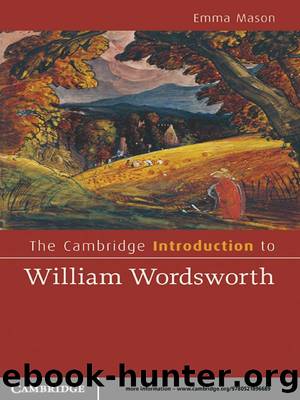The Cambridge Introduction to William Wordsworth by Emma Mason

Author:Emma Mason
Language: eng
Format: epub
Publisher: Cambridge University Press
Published: 2010-06-14T16:00:00+00:00
‘The Ruined Cottage’ and ‘The Discharged Soldier’
‘The Ruined Cottage’ (1797–8) is the first poem in which Wordsworth explicitly connects nature to the human imagination, the hero a Bible-reading pantheist rather than a rational Godwinian. ‘Pantheism’ was the belief that God was immanent in every aspect of the material universe (‘pan’ – all; ‘theos’ – God), a ‘sense sublime’, Wordsworth suggested, that was ‘deeply interfused’ in ‘all things’ (‘Tintern Abbey’, 95–102). The interconnectedness of ‘all things’ is central to ‘The Ruined Cottage’, a poem that embodies a vision of equilibrium forwarded by the pantheist character – the Pedlar – also known as ‘the wanderer’ or ‘Armytage’ in revised versions. The poem relates a conversation between a poet figure, who represents Wordsworth and his readers, and the Pedlar. As the two men sit in the doorway of a now ruined and overgrown cottage, the Pedlar begins to relate the tragic tale of a prior tenant, a war-widow called Margaret.
Margaret’s story begins after a poor harvest exacerbated by the impact of war on the rural economy. In an attempt to provide for his family, Margaret’s husband Robert joins the army, leaving his enlistment pay for them on the windowsill. As time elapses, however, Margaret begins to fear that Robert will never return, and anxiously seeks news of her absent husband from passers-by. One of these passers-by is the Pedlar, who, during regular visits to Margaret, witnesses her progressive decline into depression as she obsessively waits for Robert inside the crumbling cottage. Her mental health deteriorates further when her eldest child leaves the household to become a ‘serving-boy’ (346) for the parish and her baby dies, leaving her isolated in ‘unquiet widowhood’ (447) and paralysed by grief. Fixated on Robert’s return, Margaret locks herself into a period of painful anticipation:
And so she lived
Through the long winter, reckless and alone,
Till this reft house by frost, and thaw, and rain
Was sapped; and when she slept the nightly damps
Did chill her breast, and in the stormy day
Her tattered clothes were ruffled by the wind
Even at the side of her own fire. Yet still
She loved this wretched spot, nor would for worlds
Have parted hence.
(480–8)
Download
This site does not store any files on its server. We only index and link to content provided by other sites. Please contact the content providers to delete copyright contents if any and email us, we'll remove relevant links or contents immediately.
Still Me by Jojo Moyes(11265)
On the Yard (New York Review Books Classics) by Braly Malcolm(5525)
A Year in the Merde by Stephen Clarke(5430)
Eleanor Oliphant Is Completely Fine by Gail Honeyman(5282)
The Bookshop by Penelope Fitzgerald(3853)
How Music Works by David Byrne(3270)
Surprise Me by Kinsella Sophie(3113)
Pharaoh by Wilbur Smith(2993)
Why I Write by George Orwell(2953)
A Column of Fire by Ken Follett(2612)
Churchill by Paul Johnson(2584)
The Beach by Alex Garland(2560)
The Songlines by Bruce Chatwin(2555)
Aubrey–Maturin 02 - [1803-04] - Post Captain by Patrick O'Brian(2306)
Heartless by Mary Balogh(2259)
Elizabeth by Philippa Jones(2205)
Hitler by Ian Kershaw(2198)
Life of Elizabeth I by Alison Weir(2086)
Harry Potter and the Cursed Child by J. K. Rowling & John Tiffany & Jack Thorne(2062)
